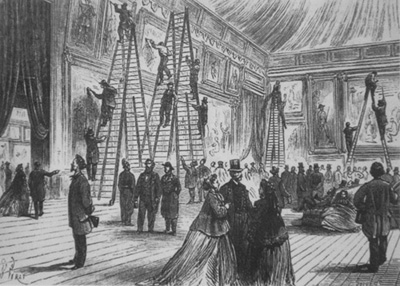Auguste Jal,The Artist and the Philosopher: Critical Conversations on the Salon of 1824
From Elizabeth Gilmore Holt, The Triumph of Art for the Public: The Emerging Role of Exhibitions and Critics (Gerden City New York: Anchor Books, 1979),pp.245-246.
This description of the classical ideal in art was written a quarter century before our period begins, but it represents an attitude towards culture that was still very much alive in the world of the French Academy at mid-century. Jal was a critic writing during the Bourbon monarchy (1815-1830) and the July Monarchy (1830-1848). Here is part of the review that he wrote of the official 1824 Salon.
LETTER FROM "THE PHILOSOPHER" TO THE AUTHOR
August 24, 1824
You love the arts and you know how I love them, my
friend. I see them as a civilizing agent and a means of perfecting the social order, and it makes me very angry
to see their power ignored today. The moral aim of painting is very dear to my heart. I do not believe that people are sufficiently concerned with it and this makes me very unhappy. One virtuous act well depicted can make more impression on a people's spirit than having the story of that act repeated a hundred times. I am sorry to see subjects without a moral, absurd traditions, frivolities of more than one sort adopted by some artists whose brushes would be ennobled by being consecrated to the great historical incidents of their country; at least they would serve to arouse the patriotism of its citizens, the filial heroism, the maternal devotion, the passion for work and order, the love of discovery and improvement, industrious competition -- in a word, all the generous impulses which make a society great but whose neglect diminishes it. An impressive development can already be noticed in France; the glory of our arms and the enterprise of our industry have placed us in the front rank among nations; let the arts, following the direction taken by literature, complete our moral education, and we will leave to posterity a moving inheritance that will combine the memory of those virtues and values which have made us the equal of the ancients and the tradition of important achievements and valuable inventions which have made us the most advanced nation in civilization.
You see, my friend, what I expect from art. I would
hope that the capable men who cultivate the arts would
understand that and be willing to enter into a path along
which there is so much honor to be gained. May this year's Salon show us that they are on this track!

B.Perat,Varnishing Painting at the Salon (Paris1866)